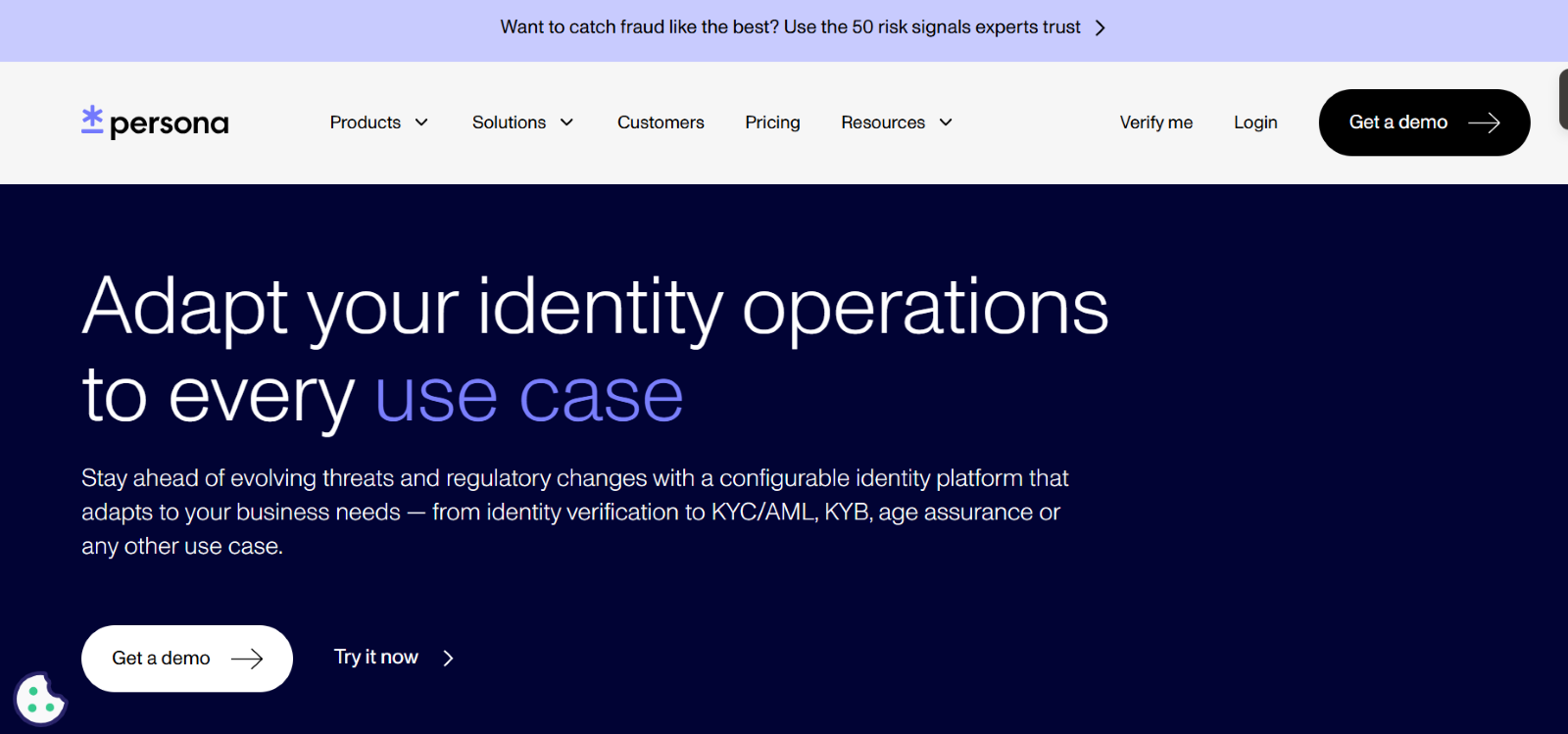

Sign Up
What is best time for the call?
Oops! Something went wrong while submitting the form.

Best Identity Verification Tools 2025 | Identity Verification Software Comparison | IT Compliance Budget Planning 2025
In an increasingly digital and remote-first world, identity verification has become the frontline defense against fraud, data breaches, and compliance violations. From KYC (Know Your Customer) mandates in finance to Zero Trust frameworks in enterprise IT, organizations across sectors need accurate, scalable, and secure identity verification tools to safeguard user access and ensure regulatory compliance.
This post explores the Top 10 Identity Verification Tools for IT Compliance & Fraud Prevention in 2025, selected based on G2 reviews, Gartner insights, and their relevance to today’s risk, compliance, and cybersecurity needs.
What is an Identity Verification Tool for IT Compliance & Fraud Prevention?
Identity verification tools are crucial for IT compliance and fraud prevention, ensuring the accuracy of user identities and protecting against malicious activities. They use various methods, like document verification, biometric analysis, and knowledge-based authentication, to confirm the identity of users and prevent unauthorized access. These tools help organizations meet regulatory requirements, establish trust with customers, and reduce the risk of fraud.
What is identity verification in cyber security?
The process of confirming or denying that a claimed identity is correct by comparing the credentials of a person requesting access with those previously proven and associated with the PIV Card or a derived PIV credential associated with the claimed identity.
What are the three types of identity verification?
Typical types of authentications are password-based, multi-factor, and biometric authentication. These different types of authentications distinguish themselves in three ways: Security: How reliable the method is.
🏆 Top 10 Identity Verification Tools in 2025
1. Auth0 by Okta
Auth0 Pricing: Tiered per user/month; enterprise available
Auth0 Licensing Options: Developer, Professional, Enterprise
Best For: B2C and B2B digital identity management
Key Focus: API-first CIAM, adaptive authentication
G2 Score: 4.5★
✅ Pros: Fast integration, robust SDKs
⚠️ Cons: Advanced features require enterprise tier
Screenshot:

2. Onfido (Entrust)
Onfido Pricing: Usage-based, custom plans
Onfido Licensing Options: API access per verification
Best For: Fintech, eCommerce, HR platforms
Key Focus: AI-powered document & biometric verification
G2 Score: 4.6★
✅ Pros: Fast onboarding, global coverage
⚠️ Cons: Occasional false positives in emerging markets
Screenshot:

3. Jumio
Jumio Pricing: Per verification, quote-based
Jumio Licensing Options: Pay-as-you-go or enterprise plans
Best For: Financial services, healthcare, crypto platforms
Key Focus: KYC/AML compliance, eKYC
Gartner Rating: Leader in biometric ID verification
✅ Pros: Strong fraud detection, compliance-ready
⚠️ Cons: Longer verification time for edge cases
Screenshot:

4. ID.me
ID.me Pricing: Freemium with enterprise licensing
ID.me Licensing Options: Transaction-based or flat-rate
Best For: Government & healthcare identity verification
Key Focus: Verified digital credentials
G2 Score: 4.3★
✅ Pros: NIST-compliant, public-sector focus
⚠️ Cons: End-user friction in some workflows
Screenshot:

5. Trulioo
Trulioo Pricing: Volume-based, quote required
Trulioo Licensing Options: API access with usage tiers
Best For: Global businesses with KYC needs
Key Focus: International ID & document verification
G2 Score: 4.4★
✅ Pros: Wide coverage across 195+ countries
⚠️ Cons: May need local fallback solutions in rare cases
Screenshot:

6. iProov
iProov Pricing: Quote-based; SaaS licensing
iProov Licensing Options: Transactional or user-based
Best For: High-security industries (finance, defense, eID)
Key Focus: Biometric liveness detection
Gartner Score: Noted Innovator
✅ Pros: Deepfake-resistant biometrics
⚠️ Cons: Premium pricing
Screenshot:

7. Socure
Socure Pricing: Custom plans based on usage volume
Socure Licensing Options: SaaS model; risk intelligence available
Best For: Fintechs, credit issuers, government programs
Key Focus: Predictive identity fraud analytics
G2 Score: 4.7★
✅ Pros: High pass rates, low fraud
⚠️ Cons: Focused primarily on the U.S. market
Screenshot:

8. IDnow
IDnow Pricing: Pay-per-verification, enterprise options
IDnow Licensing Options: Cloud-hosted SaaS
Best For: European compliance-focused companies
Key Focus: eIDAS, AML5, GDPR
Gartner Score: Regional Leader in EU
✅ Pros: Video ID & AI options
⚠️ Cons: Regionally constrained (strongest in EU)
Screenshot:

9. Shufti Pro
Shufti Pro Pricing: Subscription or pay-as-you-go
Shufti Pro Licensing Options: API-first, white-label options
Best For: eCommerce, online gaming, crypto
Key Focus: KYC/AML, age verification
G2 Score: 4.6★
✅ Pros: Competitive pricing, multilingual support
⚠️ Cons: Limited brand awareness vs top players
Screenshot:

10. Persona
Persona Pricing: Developer-friendly freemium tier; usage-based
Persona Licensing Options: Modular features on demand
Best For: Startups and mid-market apps
Key Focus: Customizable workflows, trust signals
G2 Score: 4.5★
✅ Pros: Beautiful UX, flexible flows
⚠️ Cons: Requires some dev effort to optimize
Screenshot:

Identity verification is now central to:
As attacks become more sophisticated, relying on passwords or legacy ID proofing isn’t enough. Tools that combine AI, biometrics, liveness detection, and fraud analytics provide the resilience modern organizations need.
Which method is used for identity verification?
For document verification, the organization may request that these documents be notarized or that a witness be present who can vouch credibly for the user's identity. Valid documents may include a driver's license, a passport, or other type of government ID card that includes a photo.
Who uses identity verification?
Financial institutions usually require customers to present a form of identification to complete a withdrawal or deposit transaction, cash a check, or open a new account. Government entities may require identification for access to secure areas or other purposes.
What is the process of verification?
The Verification Process is the method to provide evidence that the system or system element performs its intended functions and meets all performance requirements listed in the system performance specification and functional and allocated baselines.
Why do we need identity verification?
Identity verification services help individuals, organizations, and online platforms establish trust and prevent identity-related risks and fraud. In the digital age, where online transactions are the norm, identity verification has become even more critical.
What technology allows users to verify their identity?
Improved Biometric Technology: The ongoing development of biometric technologies, such as iris scanning, will provide even more secure and accurate methods for verifying identities. These advancements will make mobile identity verification more secure and convenient for users.
What are the three types of verification?
There are three types of functional verification, namely dynamic functional, hybrid dynamic functional/static, and static verification. Simulation-based verification (also called 'dynamic verification') is widely used to "simulate" the design since this method scales up very easily.
While these tools verify identities at the front door, organizations still need visibility into who has access to what across SaaS tools, shadow IT, and third-party apps. That’s where CloudNuro.ai steps in — offering:
👉 Book a Demo to streamline IT governance and reduce SaaS security risk.
Request a no cost, no obligation free assessment —just 15 minutes to savings!
Get StartedBest Identity Verification Tools 2025 | Identity Verification Software Comparison | IT Compliance Budget Planning 2025
In an increasingly digital and remote-first world, identity verification has become the frontline defense against fraud, data breaches, and compliance violations. From KYC (Know Your Customer) mandates in finance to Zero Trust frameworks in enterprise IT, organizations across sectors need accurate, scalable, and secure identity verification tools to safeguard user access and ensure regulatory compliance.
This post explores the Top 10 Identity Verification Tools for IT Compliance & Fraud Prevention in 2025, selected based on G2 reviews, Gartner insights, and their relevance to today’s risk, compliance, and cybersecurity needs.
What is an Identity Verification Tool for IT Compliance & Fraud Prevention?
Identity verification tools are crucial for IT compliance and fraud prevention, ensuring the accuracy of user identities and protecting against malicious activities. They use various methods, like document verification, biometric analysis, and knowledge-based authentication, to confirm the identity of users and prevent unauthorized access. These tools help organizations meet regulatory requirements, establish trust with customers, and reduce the risk of fraud.
What is identity verification in cyber security?
The process of confirming or denying that a claimed identity is correct by comparing the credentials of a person requesting access with those previously proven and associated with the PIV Card or a derived PIV credential associated with the claimed identity.
What are the three types of identity verification?
Typical types of authentications are password-based, multi-factor, and biometric authentication. These different types of authentications distinguish themselves in three ways: Security: How reliable the method is.
🏆 Top 10 Identity Verification Tools in 2025
1. Auth0 by Okta
Auth0 Pricing: Tiered per user/month; enterprise available
Auth0 Licensing Options: Developer, Professional, Enterprise
Best For: B2C and B2B digital identity management
Key Focus: API-first CIAM, adaptive authentication
G2 Score: 4.5★
✅ Pros: Fast integration, robust SDKs
⚠️ Cons: Advanced features require enterprise tier
Screenshot:

2. Onfido (Entrust)
Onfido Pricing: Usage-based, custom plans
Onfido Licensing Options: API access per verification
Best For: Fintech, eCommerce, HR platforms
Key Focus: AI-powered document & biometric verification
G2 Score: 4.6★
✅ Pros: Fast onboarding, global coverage
⚠️ Cons: Occasional false positives in emerging markets
Screenshot:

3. Jumio
Jumio Pricing: Per verification, quote-based
Jumio Licensing Options: Pay-as-you-go or enterprise plans
Best For: Financial services, healthcare, crypto platforms
Key Focus: KYC/AML compliance, eKYC
Gartner Rating: Leader in biometric ID verification
✅ Pros: Strong fraud detection, compliance-ready
⚠️ Cons: Longer verification time for edge cases
Screenshot:

4. ID.me
ID.me Pricing: Freemium with enterprise licensing
ID.me Licensing Options: Transaction-based or flat-rate
Best For: Government & healthcare identity verification
Key Focus: Verified digital credentials
G2 Score: 4.3★
✅ Pros: NIST-compliant, public-sector focus
⚠️ Cons: End-user friction in some workflows
Screenshot:

5. Trulioo
Trulioo Pricing: Volume-based, quote required
Trulioo Licensing Options: API access with usage tiers
Best For: Global businesses with KYC needs
Key Focus: International ID & document verification
G2 Score: 4.4★
✅ Pros: Wide coverage across 195+ countries
⚠️ Cons: May need local fallback solutions in rare cases
Screenshot:

6. iProov
iProov Pricing: Quote-based; SaaS licensing
iProov Licensing Options: Transactional or user-based
Best For: High-security industries (finance, defense, eID)
Key Focus: Biometric liveness detection
Gartner Score: Noted Innovator
✅ Pros: Deepfake-resistant biometrics
⚠️ Cons: Premium pricing
Screenshot:

7. Socure
Socure Pricing: Custom plans based on usage volume
Socure Licensing Options: SaaS model; risk intelligence available
Best For: Fintechs, credit issuers, government programs
Key Focus: Predictive identity fraud analytics
G2 Score: 4.7★
✅ Pros: High pass rates, low fraud
⚠️ Cons: Focused primarily on the U.S. market
Screenshot:

8. IDnow
IDnow Pricing: Pay-per-verification, enterprise options
IDnow Licensing Options: Cloud-hosted SaaS
Best For: European compliance-focused companies
Key Focus: eIDAS, AML5, GDPR
Gartner Score: Regional Leader in EU
✅ Pros: Video ID & AI options
⚠️ Cons: Regionally constrained (strongest in EU)
Screenshot:

9. Shufti Pro
Shufti Pro Pricing: Subscription or pay-as-you-go
Shufti Pro Licensing Options: API-first, white-label options
Best For: eCommerce, online gaming, crypto
Key Focus: KYC/AML, age verification
G2 Score: 4.6★
✅ Pros: Competitive pricing, multilingual support
⚠️ Cons: Limited brand awareness vs top players
Screenshot:

10. Persona
Persona Pricing: Developer-friendly freemium tier; usage-based
Persona Licensing Options: Modular features on demand
Best For: Startups and mid-market apps
Key Focus: Customizable workflows, trust signals
G2 Score: 4.5★
✅ Pros: Beautiful UX, flexible flows
⚠️ Cons: Requires some dev effort to optimize
Screenshot:

Identity verification is now central to:
As attacks become more sophisticated, relying on passwords or legacy ID proofing isn’t enough. Tools that combine AI, biometrics, liveness detection, and fraud analytics provide the resilience modern organizations need.
Which method is used for identity verification?
For document verification, the organization may request that these documents be notarized or that a witness be present who can vouch credibly for the user's identity. Valid documents may include a driver's license, a passport, or other type of government ID card that includes a photo.
Who uses identity verification?
Financial institutions usually require customers to present a form of identification to complete a withdrawal or deposit transaction, cash a check, or open a new account. Government entities may require identification for access to secure areas or other purposes.
What is the process of verification?
The Verification Process is the method to provide evidence that the system or system element performs its intended functions and meets all performance requirements listed in the system performance specification and functional and allocated baselines.
Why do we need identity verification?
Identity verification services help individuals, organizations, and online platforms establish trust and prevent identity-related risks and fraud. In the digital age, where online transactions are the norm, identity verification has become even more critical.
What technology allows users to verify their identity?
Improved Biometric Technology: The ongoing development of biometric technologies, such as iris scanning, will provide even more secure and accurate methods for verifying identities. These advancements will make mobile identity verification more secure and convenient for users.
What are the three types of verification?
There are three types of functional verification, namely dynamic functional, hybrid dynamic functional/static, and static verification. Simulation-based verification (also called 'dynamic verification') is widely used to "simulate" the design since this method scales up very easily.
While these tools verify identities at the front door, organizations still need visibility into who has access to what across SaaS tools, shadow IT, and third-party apps. That’s where CloudNuro.ai steps in — offering:
👉 Book a Demo to streamline IT governance and reduce SaaS security risk.
Request a no cost, no obligation free assessment - just 15 minutes to savings!
Get StartedWe're offering complimentary ServiceNow license assessments to only 25 enterprises this quarter who want to unlock immediate savings without disrupting operations.
Get Free AssessmentGet Started

Recognized Leader in SaaS Management Platforms by Info-Tech SoftwareReviews
